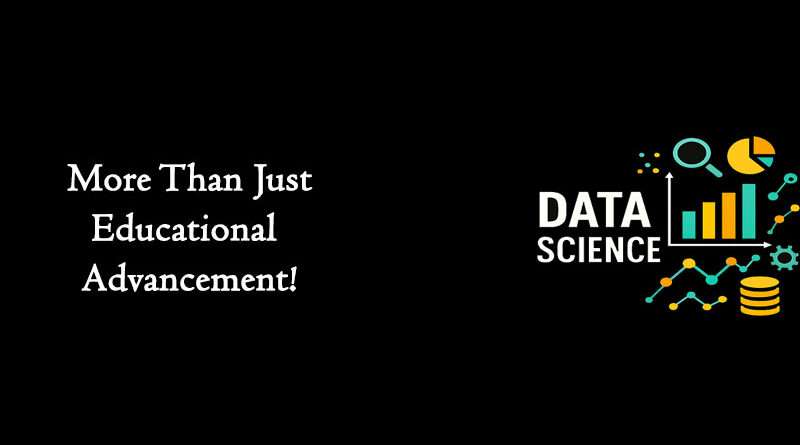Deep Dive into Data: Postgraduate Specialization for Analytical Excellence
Ironically, with the rapid emergence of data in today’s business landscape, data seems to be making its mark in how strategies are created and how decisions are made for organizations of all sectors. But forward-thinking companies can no longer count on intuition alone to achieve insights from large information repositories, as they can rely on techniques such as multivariate statistics and other forms of sophisticated analytical techniques in order to extract actionable insights. This shift has generated an unbelievable need for people who are equally skilled at data and have a business mind to rightly transform complex data patterns into a strategic advantage. Pursuing a PG in data science for career-minded professionals is more than just educational advancement; the industry in which data scientists become a part is one of the most dynamic and well-compensated industries in the modern economy.
Beyond Traditional Education: The Postgraduate Advantage
Typically, traditional data-intensive undergraduate programs cover basic facts about all disciplines, rarely addressing specific technical training required in a data-intensive role. The critical gap is bridged by postgraduate specialization, where learners are thrown headlong into the most pertinent analytical frameworks, programming languages, and visualization techniques that are contemporary to professional success. Most of these comprehensive programs are based on Python foundations, so they learn the language used in today’s data ecosystem before moving to more advanced statistical concepts and machine learning applications. Doing so will allow graduates to have theoretical understanding and practical implementation skills, which will make them stand out in competitive hiring environments.
The Technical Toolkit: From Programming to Prediction
Mastery of the versatile programming language Python is the first step to becoming an analytical excellence. Unlike theoretical approaches, effective postgraduate curriculums are hands-on with fundamental libraries such as numpy, pandas, and matplotlib for dealing with mathematical computing, data manipulation, and visualization, respectively. Such technical foundations empower professionals to safely take raw data in, perform transformations, and extract patterns to uncover business opportunities or inform new risks. Structured learning environments help those of you who come from a purely non-technical background shift and develop scaffolded coding skills to become an automated developer who can develop complex analytical workflows independently.
To the extent that programming skills are necessary to create the technical foundation, statistical education is necessary to give the intellectual framework that supports meaningful analysis. Postgraduate programs that go into depth with inferential statistics, probability distributions, and hypothesis testing, things that allow analysts to draw valid conclusions from what is incomplete, are very comprehensive. The statistical methodologies are used to answer important business questions such as: Is the observed sales increase statistically significant or random variation? Which customer segments should be targeted with the marketing? What production factors most influence product quality? After mastering these statistical techniques, professionals describing what happened to explaining why it happened and even predicting what will come next.
Machine Learning Applications: From Theory to Implementation
Statistical foundations lead to natural progression of machine learning (supervised) such as linear regression for continuous predictions and classification for categories. In logistic regression for binary outcomes, decision trees for transparent decision rules are studied, and in the case of better accuracy, ensemble methods are used. The refinement of these methodologies effectively depicts how companies will decide what methods to choose based on features of data and what you want to accomplish, which is very common; real life analytical workflow is like that. When these algorithms are implemented by graduates using industry standard tools, graduates implement the algorithms in a way which is immediately applicable in professional settings and also develop theoretical understanding
Cross-Industry Relevance: From Finance to Future Mobility
The ideas of data science fundamentals remain the same for all the industries but their application is so varying from detecting financial fraud to optimizing supply chains to personalizing customer experiences. While there is still some diversity in terms of the projects and courses organizations can offer, some forward thinking educational programs realize that this diversity and add industry laptop to contextualize technical concepts within the specific industry frameworks. The merging of data science and sustainable transportation is particularly innovative because people that know how to do both analytical work and from an EV design course position themselves at the intersection of two transformative fields. Wheels moving massive amounts of data are the default development of electric vehicles, which opens up opportunities for the role of data scientists in the making of transportation’s future.
Beyond Technical Skills: The Professional Differentiators
Almost never does technical proficiency set apart outstanding data professionals. The most valuable practitioners are good at communication, analytical capabilities, business understanding, and ethical awareness. Elite postgraduate programs recognize this reality, incorporating interactive learning experiences that develop presentation abilities and stakeholder management techniques. Through case-based learning and collaborative projects, students learn to translate technical insights into compelling narratives that drive organizational action. This holistic approach produces graduates capable not just of conducting analyses but of influencing strategic decisions based on analytical findings—professionals who serve as bridges between technical and business domains.



